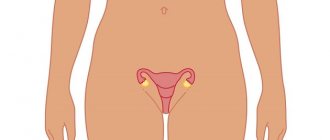First vaccination in the maternity hospital
The answer to whether newborns need to be vaccinated in the first days of their life lies in the nature of vaccination.
Important! The main purpose of vaccination for newborns in the maternity hospital is to protect the child’s body from diseases.
After birth, the baby's immune system is weakened. Maternal immunity does not guarantee protection for the newborn. There is conflicting opinion regarding whether to get the first vaccinations. This is associated with cases of complications and deaths after vaccination. Nevertheless, the medical community insists on their feasibility. The procedures performed on infants create immunity against deadly diseases. As a result, the list of benefits exceeds the list of side effects. It should be remembered that vaccination is the responsibility of parents.
Examination of a newborn by a doctor
From birth to the age of 1.5 years, a child must be vaccinated with 9 vaccines. In this case, the first 2 are administered to newborn children during their stay in the maternity hospital. The list includes the following vaccines:
- from hepatitis B;
- from tuberculosis.
There are no mandatory regulations on the part of medical institutions that should be followed in terms of vaccination. Komarovsky and other doctors note that the lack of immunity predetermines that a child is at risk. This is why it is suggested that the child be given the vaccine in infancy. Komarovsky recommends vaccinations for newborns in the maternity hospital.
Certificate of preventive vaccinations
Possible conditions after vaccination
In addition to the fact that vaccination causes stress for the child, other conditions may also occur:
- the child is capricious, crying;
- the child's temperature rises;
- redness and thickening of the skin at the injection site appears;
- there are allergic reactions, rash;
- the child eats worse and sleeps more restlessly.
All these manifestations are considered a normal reaction of the body. Only if the temperature is very high should the child be given an antipyretic drug. An increase in temperature is a signal that the baby’s immune system has activated and is actively producing antibodies against the virus, and an increased body temperature is an antimicrobial factor, since many microbes are not able to survive at high temperatures.
Is it possible to refuse vaccination of a child?
Of course yes. Responsibility for the health of the child lies entirely on the shoulders of the parents. If you have made an informed decision to refuse, you must write a corresponding statement in two copies. The first copy must be included in the exchange card, the second must be given to the doctors in the postpartum department. It is also necessary to verbally notify the employees of the medical institution about the refusal to vaccinate.
If parents have decided to refuse vaccination, then the expectant mother should mentally prepare for the possibility of psychological pressure and agitation from medical personnel in favor of preventive vaccinations. This pressure is due not so much to good intentions as to the “vaccination plan” in force in all public medical institutions.
Most modern doctors still agree that it is necessary to vaccinate newborns against hepatitis B and tuberculosis. The risks of complications after vaccination are much lower than the possible consequences after infection with these diseases.
If parents are not ardent opponents of vaccinations, but do not want to expose the fragile body of a newborn baby to danger, vaccination can be delayed. In this case, the local pediatrician must draw up an individual vaccination schedule in accordance with the wishes of the parents.
We also recommend reading: Patronage nurse
Hepatitis vaccination
Parents often wonder what type of hepatitis they vaccinate against in the maternity hospital? hepatitis B virus vaccine.
Vaccination against hepatitis in the maternity hospital is given during the 12-hour period of infant life. This disease is dangerous because it affects the nervous and digestive systems.
Vaccination in the maternity hospital
The hepatitis vaccine is administered for the following reasons:
- Hepatitis affects the liver , which performs a cleansing function. From the first minutes of life, the organ ensures the formation of bilirubin as a result of the destruction of maternal red blood cells.
- The liver is involved in the process of first nutrition and digestion.
- The organ is responsible for hormonal production for the absorption of food.
- The disease has a destructive effect on the gallbladder and ducts.
- The disease is characterized by a hidden nature of its course.
- The disease is characterized by a long incubation period (can reach 12 weeks).
- The hepatitis virus is characterized by rapid spread and relative resistance to external factors, which causes mass infection.
Since a newborn is at risk, vaccination against hepatitis in the maternity hospital is carried out during the first day of his life. It is recommended to administer the vaccine intramuscularly into the anterior outer thigh. For the procedure, domestic and foreign (Belgium, USA, Israel) raw materials are used. The material is purified. As a result, allergic reactions occur extremely rarely. may rise slightly.
The indications for whether to vaccinate against hepatitis B in the maternity hospital are:
- lack of research into the health of the expectant mother for this disease;
- detection of the virus in the expectant mother;
- presence of drug addiction in the child’s parents.
There are several methods of grafting:
- standard scheme: the vaccine is administered immediately after birth, after a month and after six months;
- scheme for accelerated immunoproduction: the first vaccination is given after birth, the second and third - at a monthly interval in relation to each other; the last procedure – after 12 months; recommended for children at risk;
- emergency vaccination scheme: vaccination is carried out at the moment of birth, after one and three weeks; the last stage – in a year; relevant for children whose condition requires surgical intervention;
Mother's consent is required for vaccination .
For this purpose, a supporting document is filled out in two copies. If parents are against vaccination, the medical staff must be warned about this in advance. It is important to remember that a single vaccination does not have a long-term effect. If it was missed in the maternity hospital, the vaccination schedule is prescribed by the local pediatrician. If the next procedure is skipped, then vaccination begins from the very beginning.
Vaccines from different manufacturers can be used for vaccinations. This is due to the interchangeability of materials. However, it is recommended to introduce a product from one company. To clarify the information, medical record data is used.
Contraindications to vaccination are:
- prematurity of the child (weight below 2 kg);
- low Apgar score;
- diagnosing a child with hepatitis received from the mother;
- acute illness;
- meningitis;
- damage to the skin with the presence of diseases of purulent-septic manifestations;
- intrauterine infections;
- period of exacerbation of an infectious disease;
- hemolytic anemia;
- pathologies of the central nervous system (CNS);
- autoimmune diseases (including primary immunodeficiency).
side effects may occur
- change in body temperature (increasing);
- increased sweating;
- hyperemia of the skin in the area where the vaccine was administered;
- fatigue;
- pain in joints and muscles;
- allergic reactions (up to anaphylactic shock ).
Correctly carried out vaccination guarantees protection of the child’s body from hepatitis B for a 15-22 year period.
A premature baby has contraindications for vaccinations
Vaccination against tuberculosis
Among the vaccinations given to newborns in the maternity hospital, it is customary to single out the tuberculosis vaccine (BCG). This abbreviation refers to the Calmette-Gener bacillus.
It should be noted that maternal immunity is not transmitted in utero to the child. As a result, the disease can affect:
- gastrointestinal tract;
- reproductive organs;
- excretory system;
- CNS;
- organs of vision.
Vaccination is carried out from 3 to 7 days after the birth of the child. The purpose for which vaccination is administered in the first days of life is protection against tuberculosis. The main objectives of vaccination are as follows:
- prevention of severe complications as a result of the disease;
- reduction in morbidity rates;
- leveling of deaths.
The vaccine is recommended to be administered intradermally into the area at the border of the upper and middle third of the left shoulder. The procedure requires exclusively fresh material.
Vaccination against tuberculosis
Among the contraindications for this procedure, it is customary to highlight:
- the presence of immunodeficiency (congenital or acquired) in the child’s parents;
- identifying complications resulting from the procedure in other family members;
- enzyme deficiency;
- pathologies of the central nervous system;
- particularly severe hereditary diseases .
Temporary contraindications include :
- prematurity of the child;
- hemolytic anemia;
- diagnosing an infectious disease.
Side effects after the vaccine include:
- local reaction (there is an inflammatory stage, a necrosis stage, an ulcer is formed; a scar is formed);
- lethargy of the child;
- inflammatory process in the area of the cervical and axillary lymph nodes;
- infectious lesion.
What are preventive vaccinations
Preventive vaccination is a method of developing immunity in a person against certain diseases that are difficult to treat. The vaccine consists of weakened microbes that cause the corresponding disease, against which the body produces antibodies.
Vaccination against hepatitis B.
Hepatitis B is a serious viral disease that is transmitted through blood or saliva and leads to liver damage. If the new mother has a positive hepatitis status, then the child should be vaccinated within the first 12 hours of life.
Contraindications for vaccination are prematurity, when the baby weighs less than 2 kilograms and a low Apgar score. The vaccine is injected intramuscularly into the anterior/lateral surface of the thigh. Revaccination is required at the ages of 1 and 6 months.
Vaccination against tuberculosis
Better known to us as BCG. It is also placed in the maternity hospital from the 3rd to the 7th day of the baby’s life. The danger of tuberculosis is that it is transmitted by airborne droplets without direct contact with a sick person. According to the World Health Organization, about 2 million people die from tuberculosis every year around the world. The infection affects the lungs and bones and leads to disability. An important point is that immunity against tuberculosis is not transmitted from mother to child, so the baby’s body must develop it itself. The injection is given intradermally in the left shoulder. Many mothers are concerned about the wound that forms after the BCG vaccination. But there is no need to panic. The main thing is that when the baby reaches one year, the injection site is completely healed. Babies weighing up to 2 kilograms are also not given this vaccine. Other contraindications are: the presence of people in the family with immunodeficiency, damage to the central nervous system, infectious processes in the body. Immunity from tuberculosis remains in the body of a child of 6-7 years old, therefore, if the Mantoux reaction is negative, revaccination is carried out at 7 and 14 years old.
We also recommend reading: Birthmarks in newborns
Vaccinations for newborns: pros and cons
The question of whether newborns should be vaccinated in the maternity hospital is an open question. There is no consensus among both parents and specialists.
Important! The decision regarding vaccination of newborns in the maternity hospital is made by parents.
Previously, responsibility in this aspect lay with medical personnel. All healthy infants were vaccinated.
The possibility of evaluating pros and cons is related to complications after vaccination. Natural jaundice is especially common. After administration of the vaccine, it may be aggravated by conjugation jaundice. This pathology is associated with liver cirrhosis. Therefore, it is recommended to postpone the first vaccinations until the newborn’s condition has stabilized. Useful video: Dr. Komarovsky about whether newborns need to be vaccinated?
The likelihood of newborns being affected by infection forces vaccination. In the first days of life, the child is vaccinated against hepatitis B and BCG. New parents decide whether newborns need to be vaccinated immediately in the maternity hospital.











